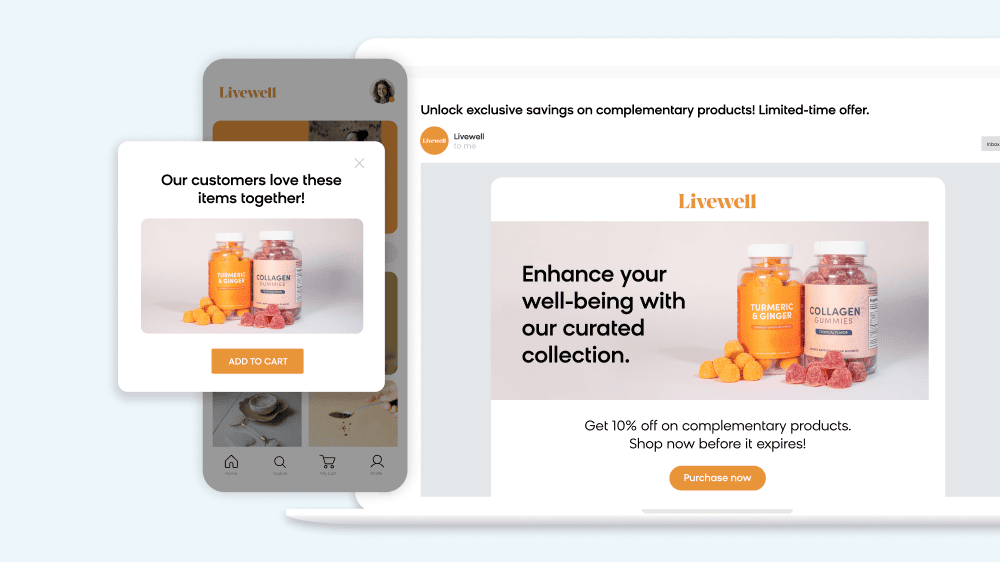Ecommerce chatbots have been around for a few years — which, in the world of ecommerce, makes them part of the furniture.
But with recent developments in AI and the evolving ecommerce landscape, the role of chatbots is being reexamined, and online retailers are renewing their approach to incorporating these tools into their online experience.
These chatbot solutions are quickly growing beyond the scope of what was previously possible, and with artificial intelligence driving constant innovation, companies can’t afford to ignore how influential these technologies will be in shaping the future of ecommerce.
Here’s everything you need to know about ecommerce chatbots and how you can use them to the benefit of your business.
What Is an Ecommerce Chatbot?
An ecommerce chatbot is a computer program that communicates with customers via an online platform. Ecommerce chatbots are designed to mimic human conversation, allowing customers to engage with an ecommerce business in a more conversational and personal way.
The ultimate goal of ecommerce chatbots is to stand in as a virtual agent, assisting customers with a variety of online shopping tasks and answering any questions they might have. And with the recent rise of AI-powered tools like ChatGPT and Bloomreach Clarity, chatbots and AI assistants have evolved in leaps and bounds, making this goal an attainable one.
Up until recently, chatbots were limited to a rule-based system that restricted communication to a set number of predetermined responses. These chatbots of yesteryear were self-contained systems that couldn’t hold back-and-forth conversations. They resembled automated phone menus, guiding users through a series of preset choices to reach default answers, which limited the detail and range of what these conversations could be.
Because of this, ecommerce chatbots were predominantly used for simple, straightforward interactions, like providing information on business hours or processing basic customer service requests.
But those limitations are things of the past, thanks to the rise of advanced AI technologies. Today, AI-powered ecommerce chatbots are capable of comprehending text and speech and offering responses that go well beyond a basic script.
Best AI Chatbots for Ecommerce in 2025
AI chatbots for ecommerce fall into several categories based on their sophistication and capabilities:
Rule-based chatbots offer structured interactions through predetermined conversation flows, ideal for handling frequently asked questions and basic customer service requests. While limited in flexibility, they provide consistent responses and work well for businesses with straightforward support needs.
AI-powered conversational chatbots leverage natural language processing and machine learning to understand customer intent and provide more dynamic responses. These solutions can handle complex queries and adapt their responses based on context and customer behavior.
The key differentiators among platforms include integration capabilities with major ecommerce systems, AI sophistication levels, pricing models ranging from per-conversation to enterprise licensing, and implementation complexity.
How AI Revolutionized Ecommerce Chatbots
AI has completely transformed ecommerce chatbots from conventional systems into effective, intelligent tools.
Instead of restricting users to a predetermined set of questions they can ask, ecommerce chatbots can harness natural language processing (NLP) to analyze and grasp human intent in the prompts they receive. They can understand any question they’re faced with, even when customer queries are written with colloquialisms, shorthand, or slang.
These chatbots can also generate constructive responses to prompts without relying on a rule-based system. Thanks to generative AI, ecommerce chatbots can have conversations that build and grow into unique customer experiences, with an ecommerce chatbot formulating answers in real time.
Agentic AI has taken this even further. This advanced technology uses AI agents to autonomously engage customers. What really sets agentic AI solutions apart from older technology is the ability for these agents to independently understand, learn, and adapt their actions based on customer preferences and behaviors. They’ll continue improving with each new interaction and can seamlessly incorporate individual preferences into the conversation.
These new AI-powered features have added limitless potential to what chatbots and virtual shopping assistants can do for ecommerce businesses. These tools are no longer restricted to answering frequently asked questions and defaulting to a human representative when confronted with a complex query.
Now, AI chatbots can help online shoppers find the perfect product to suit their needs. Thanks to the power of agentic AI, they can converse with your audience in an organic and constructive way, actively engaging with them as human agents would. They can help customers navigate an online store, take part in the sales process, make informed product suggestions, and help increase customer satisfaction.
In short, ecommerce chatbots can revolutionize the way your customers interact with your brand. The uses for ecommerce chatbots are only limited by your imagination and what you want your customer experience to look like.
How to Choose the Right Ecommerce Chatbot Platform
Selecting the ideal AI chatbot platform for your ecommerce business requires careful evaluation of several key factors:
Integration capabilities should be your first consideration. The platform must seamlessly connect with your existing ecommerce infrastructure, whether you’re using Shopify, Magento, BigCommerce, or custom solutions. Look for platforms that offer pre-built connectors and APIs that support your current tech stack.
AI sophistication levels vary significantly across providers. Evaluate the natural language processing capabilities, machine learning algorithms, and conversational commerce features. Consider whether the platform can handle complex product recommendations, understand customer intent, and provide automated customer support that matches your brand voice.
Pricing models and ROI considerations include per-conversation fees, monthly subscriptions, or enterprise licensing. Calculate the potential impact on key metrics like cart abandonment recovery and customer satisfaction scores (CSAT) to determine long-term value.
Implementation complexity and support options determine how quickly you can deploy and optimize your chatbot. Look for platforms offering comprehensive onboarding, training resources, and ongoing technical support to ensure successful implementation.
AI Chatbot Integration with Shopify, Magento, and BigCommerce
Platform-specific integrations enable AI chatbots to access crucial ecommerce data and provide more personalized customer experiences.
Shopify Integration
AI chatbots integrated with Shopify can access real-time inventory data, customer order history, and product catalogs. This enables personalized product recommendations, automated order tracking updates, and seamless cart abandonment recovery campaigns. Shopify’s App Store offers numerous chatbot solutions with varying levels of AI sophistication and customization options.
Magento Integration
Magento’s flexible architecture allows for chatbot integrations that can leverage customer segmentation data, complex product configurations, and multi-store management capabilities. AI chatbots can assist with B2B quote requests, custom product configurations, and advanced inventory management across multiple storefronts.
BigCommerce Integration
BigCommerce integrations enable chatbots to access comprehensive customer profiles, abandoned cart data, and detailed product information. The platform’s API-first approach facilitates custom chatbot implementations that can handle complex customer service scenarios and provide intelligent product discovery experiences.
AI Chatbots vs Live Chat: What’s Better for Ecommerce?
The choice between AI chatbots and traditional live chat depends on your business needs, customer expectations, and operational constraints.
Cost efficiency heavily favors AI chatbots, which can handle thousands of simultaneous conversations without additional staffing costs. According to IBM research, conversational AI can decrease customer service costs by up to 30%. While live chat requires human agents for each interaction, AI solutions scale infinitely once implemented.
24/7 availability represents a significant advantage for AI chatbots. Customers can receive immediate assistance regardless of time zones or business hours, crucial for global ecommerce operations and customer satisfaction.
Scalability advantages of AI solutions become apparent during peak shopping periods. Black Friday, holiday seasons, and flash sales can overwhelm human support teams, but AI chatbots maintain consistent response times regardless of volume.
7 Key Use Cases for Ecommerce Chatbots
Chatbots are highly versatile tools that can be used in numerous ways to enhance the customer journey. Here are the seven most impactful ways to deploy them in your ecommerce business:
1. Answering Personalized Questions
Ecommerce chatbots excel at providing quick answers to common customer inquiries. Whether it’s information about shipping policies or details on a particular product, a chatbot can provide instant responses that keep your customers happy and engaged with your brand.
An ecommerce chatbot can be the go-to resource for your customers to turn to without having to hunt down information or find the relevant page on your website, ensuring that your customers won’t get overwhelmed or frustrated by trying to find answers to their questions. With a chatbot readily available to help with any pressing issues, customers can resolve concerns quickly and get back to shopping at your ecommerce store.
And with an agentic AI-powered chatbot, your responses aren’t limited to basic or general information. An AI chatbot can handle questions that are unique and specific to the prompter’s current buying journey, responding directly to user input to give them the right answer.
If a shopper has a question during their shopping experience — like when an item will be back in stock, the dimensions of a product they are considering purchasing, which products would pair best with their recent purchase, or where the closest store location is to them — an ecommerce chatbot can quickly and easily address their concerns.
These are the types of questions that a sales associate would be able to answer for a customer if they were shopping in a brick-and-mortar store, and an ecommerce chatbot powered by AI can fill that role in the digital shopping experience.
2. Helping Customers Find Products
Connecting your customers with the right products is the goal of any ecommerce experience, and ecommerce chatbots can help streamline that process.
Ecommerce chatbots can act as personal shopping assistants, and the two-way conversations they are capable of can help customers find products that fit their preferences.
By asking a series of targeted questions, a chatbot can narrow down product options, make personalized recommendations, and guide shoppers on an individualized customer journey that caters to their unique needs.
Assimilating data points like a customer’s style, unique attributes, and preferred categories can make your ecommerce chatbot feel like a helpful, reliable tool for your customers to use. An outdoor sports brand, for instance, could steer chatbot conversations by asking about a customer’s preferred outdoor activity, their location, and the weather conditions they face to recommend the most suitable products to fit their needs.
With the right framework for these conversations, an ecommerce chatbot can help customers make informed decisions and have the best possible experience with your brand.
3. Managing Orders and Returns
Tracking orders and handling ecommerce returns is an integral part of online shopping, and it’s a process that every customer wants to be seamless and hassle-free. An ecommerce chatbot can be an invaluable tool for helping your customers stay updated on their shipping order status and helping them navigate the returns process.
With the ability to identify and coordinate data points faster than any human agent can, ecommerce chatbots can streamline tracking and returns, making it as efficient and responsive as possible. Customers can inquire through an ecommerce chatbot about the status of their order or return and get a real-time update, making the process smooth and convenient.
And that is ultimately what any customer wants from your brand when they request updates on their order or want to return a product — they’re looking for a customer-friendly experience that can clearly communicate the most important details on their specific issue, which is exactly what an ecommerce chatbot offers.
4. Offering Promotions and Discounts
Chatbots are also excellent at promoting sales and discounts. They can be used to notify customers about ongoing sales, offer discount codes, and suggest products based on previous purchases.
An AI-powered chatbot can take massive amounts of data into account for each interaction it has with your customers, utilizing all of the relevant data on your products and connecting it with the relevant personal data of the customer it’s conversing with. With this in-depth knowledge of your business and your relationship with your customers, chatbots can offer sales and discounts that are most relevant to each shopper, and do so in real time as that person is shopping and interacting with your business.
Chatbots that are integrated across multiple marketing channels can be particularly effective with this tactic. Having an ecommerce chatbot that can promote sales to customers via Facebook Messenger or through SMS messages, and then hold back-and-forth conversations that help customers shop for products directly through the chatbot, can inspire customers to shop your sale and form a deeper connection with your brand.
5. Conducting Market Research
On top of the countless customer-facing benefits, ecommerce chatbots can be powerful analytical tools that offer a detailed look at your business’s target audience.
As chatbots converse with your customers, they collect valuable customer data and feedback. Every interaction is a useful data point when taken into context, providing insights into customer behavior, preferences, and satisfaction levels.
All this data can fuel your marketing campaigns, help you understand emerging trends, shape a more streamlined buying experience, improve your products and services, and more.
Whenever your customers engage with your ecommerce chatbot, they are speaking directly to your business and providing valuable zero-party data, and your business can’t afford not to build on those interactions.
6. Cart Abandonment Recovery
One of the most powerful applications of ecommerce chatbots is reducing cart abandonment rates through proactive engagement. With average cart abandonment rates at 70.22%, this represents a significant opportunity for ecommerce businesses.
When customers leave items in their cart without completing the purchase, AI chatbots can automatically reach out with personalized messages to reengage them. These chatbots can offer assistance with the checkout process, provide additional product information, or present special incentives to encourage completion. By analyzing customer behavior patterns, chatbots can determine the optimal timing and messaging approach for each individual customer.
Research shows that proactive conversation approaches can result in 35% recovery rates, making cart abandonment recovery one of the most ROI-positive chatbot applications.
7. Post-Purchase Support and Upselling
After a customer completes their purchase, chatbots continue to provide value through post-purchase support and strategic upselling opportunities. They can proactively send order confirmations, shipping updates, and delivery notifications while remaining available for any post-purchase questions.
Additionally, chatbots can identify opportunities to suggest complementary products, accessories, or upgrades based on the customer’s purchase history and browsing behavior. This ongoing engagement helps increase customer lifetime value while maintaining high satisfaction scores. According to research, companies using AI-driven customer lifetime value analysis experience an average 25% increase in customer retention and 15% rise in revenue growth.
Key Benefits of Ecommerce Chatbots
The use of chatbots in ecommerce comes with an array of benefits. Here are some key advantages:
24/7 Customer Assistance
First and foremost, ecommerce chatbots provide customer support whenever your shoppers need it. These tools are available around the clock, so customers can get their queries answered at any time.
Having this always-on service is essential for ecommerce businesses. Online shopping provides an opportunity for customers to shop from anywhere and at any time — they’re no longer restricted by store hours or where they live in relation to a store. Your customer service can’t be limited, either, and chatbots can be your business’s steadfast customer assistant that ecommerce demands.
Unlocking a New Audience
When it comes to ecommerce site search, brands traditionally focus on the small group of high-intent shoppers. Research shows that 69% of consumers go straight to the search bar when visiting an ecommerce site, but 80% admit leaving because the on-site search experience didn’t meet their expectations. This means that browsers who need more guidance often get left behind.
With advanced AI assistants and chatbots, though, you can now reach these browsers and help them convert. When a shopper is having trouble finding something (such as by clicking through several product pages without adding anything to their cart), you can trigger an ecommerce chatbot to offer assistance. From here, you can deliver the back-and-forth conversation needed to help push that customer to the finish line.
Increased Sales
Ecommerce chatbots aren’t just systems that help customers with problems. They can play an active role in the customer journey, enrich the shopping experience, and drive sales.
An ecommerce chatbot can engage with customers in a simulated human conversation, helping them with any issues and guiding them to convert without straying from the buying process. It’s a dependable assistant that can keep your shoppers on track, make personalized recommendations based on the input that your customers provide, and organically guide your shoppers to purchase.
When you have an ecommerce chatbot geared toward connecting customers with the right products, the entire customer journey can be refined — it can help you reduce cart abandonment rates, increase your customer lifetime value, and create long-lasting relationships with loyal customers.
Ecommerce Chatbot Best Practices
To make the most of your ecommerce chatbot, here are some best practices to follow:
- Know what you want your chatbot to accomplish. An ecommerce bot can enhance so many aspects of your business, but it’s important to know where it fits into your customer experience. This is even easier with an agentic AI assistant. Simply tell the AI what goal you’d like to accomplish, and watch it work its magic.
- Train your chatbot with the right data to ensure it provides accurate and relevant responses. Your chatbot needs to know your business, your products, and your customers as well as a human customer service agent would to provide an adequate customer experience.
- Design your chatbot to reflect your brand’s voice and personality. Remember, your chatbot is an extension of your brand’s customer service capabilities, so it should reflect your company’s values and image.
- Ensure your chatbot respects user privacy and complies with data protection regulations. The data your chatbot needs to answer your customers’ questions requires gathering and analyzing their information, which means your business becomes responsible for the privacy and security of that user data. Proper consent management capabilities and policies are essential to make this process safe and secure.
Conversational Commerce and the Future of Ecommerce Chatbots
The evolving role of chatbots is leading ecommerce in an exciting direction — one where agentic AI and conversational commerce reshape the way we shop and engage with the brands we love. The global conversational AI market, valued at $12.24 billion in 2024, is expected to grow to $61.69 billion by 2032, exhibiting a compound annual growth rate of 22.6%.
Soon, artificial intelligence will play the leading role in the buying journey, and modern businesses need to embrace and leverage AI to stay ahead of the curve.
Bloomreach is making this new era a reality with Clarity, our AI-powered conversational shopping agent built for modern ecommerce.
Bloomreach Clarity is trained on real-time customer data, your product catalogs, and our 15+ years of data on how customers shop and search, offering every customer the most personalized and relevant experience whenever they interact with your brand.
It goes beyond the current scope of ecommerce chatbots to serve as a product expert, engaging shoppers in conversations that are authentic and specific to your business. It can help your customers find the exact product they’re looking for, guide shoppers who don’t have a specific product in mind, make personalized recommendations based on every customer’s unique needs and preferences, and much more.
Learn more about Bloomreach Clarity today and unlock the power of conversational shopping for your business.


















